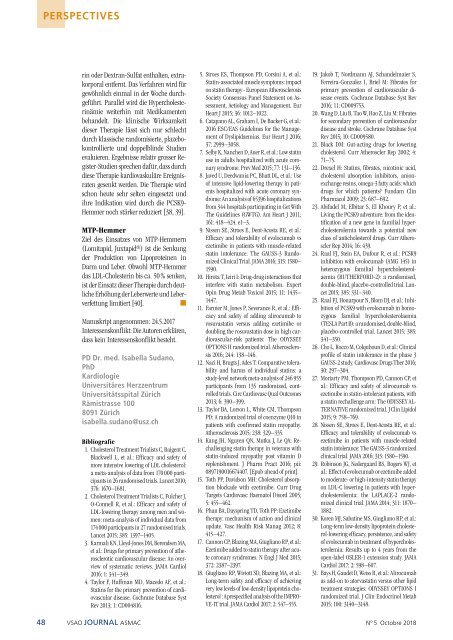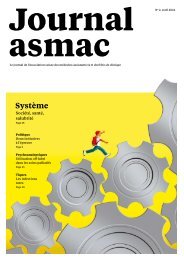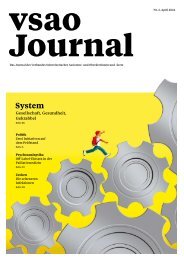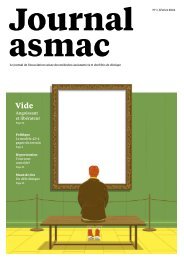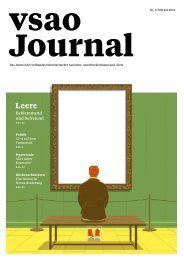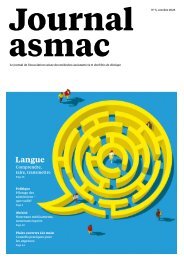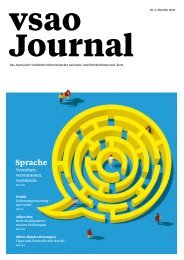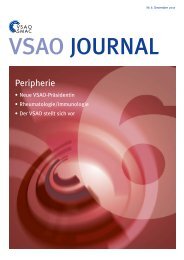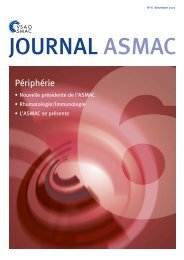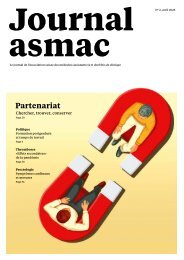JOURNAL ASMAC No 5 - octobre 2018
Energie - Oncologie Médecine pharmaceutique Financement uniforme - oui, mais
Energie -
Oncologie
Médecine pharmaceutique
Financement uniforme - oui, mais
You also want an ePaper? Increase the reach of your titles
YUMPU automatically turns print PDFs into web optimized ePapers that Google loves.
PERSPECTIVES<br />
rin oder Dextran-Sulfat enthalten, extrakorporal<br />
entfernt. Das Verfahren wird für<br />
gewöhnlich einmal in der Woche durchgeführt.<br />
Parallel wird die Hypercholesterinämie<br />
weiterhin mit Medikamenten<br />
behandelt. Die klinische Wirksamkeit<br />
dieser Therapie lässt sich nur schlecht<br />
durch klassische randomisierte, plazebokontrollierte<br />
und doppelblinde Studien<br />
evaluieren. Ergebnisse relativ grosser Register-Studien<br />
sprechen dafür, dass durch<br />
diese Therapie kardiovaskuläre Ereignisraten<br />
gesenkt werden. Die Therapie wird<br />
schon heute sehr selten eingesetzt und<br />
ihre Indikation wird durch die PCSK9-<br />
Hemmer noch stärker reduziert [38, 39].<br />
MTP-Hemmer<br />
Ziel des Einsatzes von MTP-Hemmern<br />
(Lomitapid, Juxtapid ® ) ist die Senkung<br />
der Produktion von Lipoproteinen in<br />
Darm und Leber. Obwohl MTP-Hemmer<br />
das LDL-Cholesterin bis ca. 50 % senken,<br />
ist der Einsatz dieser Therapie durch deutliche<br />
Erhöhung der Leberwerte und Leberverfettung<br />
limitiert [40]. ■<br />
Manuskript angenommen: 24.5.2017<br />
Interessenskonflikt: Die Autoren erklären,<br />
dass kein Interessenskonflikt besteht.<br />
PD Dr. med. Isabella Sudano,<br />
PhD<br />
Kardiologie<br />
Universitäres Herzzentrum<br />
Universitätsspital Zürich<br />
Rämistrasse 100<br />
8091 Zürich<br />
isabella.sudano@usz.ch<br />
Bibliografie<br />
1. Cholesterol Treatment Trialists C, Baigent C,<br />
Blackwell L, et al.: Efficacy and safety of<br />
more intensive lowering of LDL cholesterol:<br />
a meta-analysis of data from 170 000 participants<br />
in 26 randomised trials. Lancet 2010;<br />
376: 1670–1681.<br />
2. Cholesterol Treatment Trialists C, Fulcher J,<br />
O›Connell R, et al.: Efficacy and safety of<br />
LDL-lowering therapy among men and women:<br />
meta-analysis of individual data from<br />
174 000 participants in 27 randomised trials.<br />
Lancet 2015; 385: 1397–1405.<br />
3. Karmali KN, Lloyd-Jones DM, Berendsen MA,<br />
et al.: Drugs for primary prevention of atherosclerotic<br />
cardiovascular disease: An overview<br />
of systematic reviews. JAMA Cardiol<br />
2016; 1: 341–349.<br />
4. Taylor F, Huffman MD, Macedo AF, et al.:<br />
Statins for the primary prevention of cardiovascular<br />
disease. Cochrane Database Syst<br />
Rev 2013; 1: CD004816.<br />
5. Stroes ES, Thompson PD, Corsini A, et al.:<br />
Statin-associated muscle symptoms: impact<br />
on statin therapy - European Atherosclerosis<br />
Society Consensus Panel Statement on Assessment,<br />
Aetiology and Management. Eur<br />
Heart J 2015; 36: 1012–1022.<br />
6. Catapano AL, Graham I, De Backer G, et al.:<br />
2016 ESC/EAS Guidelines for the Management<br />
of Dyslipidaemias. Eur Heart J 2016;<br />
37: 2999–3058.<br />
7. Selby K, Nanchen D, Auer R, et al.: Low statin<br />
use in adults hospitalized with acute coronary<br />
syndrome. Prev Med 2015; 77: 131–136.<br />
8. Javed U, Deedwania PC, Bhatt DL, et al.: Use<br />
of intensive lipid-lowering therapy in patients<br />
hospitalized with acute coronary syndrome:<br />
An analysis of 65396 hospitalizations<br />
from 344 hospitals participating in Get With<br />
The Guidelines (GWTG). Am Heart J 2011;<br />
161: 418–424. e1–3.<br />
9. Nissen SE, Stroes E, Dent-Acosta RE, et al.:<br />
Efficacy and tolerability of evolocumab vs<br />
ezetimibe in patients with muscle-related<br />
statin intolerance: The GAUSS-3 Randomized<br />
Clinical Trial. JAMA 2016; 315: 1580–<br />
1590.<br />
10. Hirota T, Ieiri I: Drug-drug interactions that<br />
interfere with statin metabolism. Expert<br />
Opin Drug Metab Toxicol 2015; 11: 1435–<br />
1447.<br />
11. Farnier M, Jones P, Severance R, et al.: Efficacy<br />
and safety of adding alirocumab to<br />
rosuvastatin versus adding ezetimibe or<br />
doubling the rosuvastatin dose in high cardiovascular-risk<br />
patients: The ODYSSEY<br />
OPTIONS II randomized trial. Atherosclerosis<br />
2016; 244: 138–146.<br />
12. Naci H, Brugts J, Ades T: Comparative tolerability<br />
and harms of individual statins: a<br />
study-level network meta-analysis of 246 955<br />
participants from 135 randomized, controlled<br />
trials. Circ Cardiovasc Qual Outcomes<br />
2013; 6: 390–399.<br />
13. Taylor BA, Lorson L, White CM, Thompson<br />
PD: A randomized trial of coenzyme Q10 in<br />
patients with confirmed statin myopathy.<br />
Atherosclerosis 2015; 238: 329–335.<br />
14. Kang JH, Nguyen QN, Mutka J, Le QA: Rechallenging<br />
statin therapy in veterans with<br />
statin-induced myopathy post vitamin D<br />
replenishment. J Pharm Pract 2016; pii:<br />
0897190016674407. [Epub ahead of print].<br />
15. Toth PP, Davidson MH: Cholesterol absorption<br />
blockade with ezetimibe. Curr Drug<br />
Targets Cardiovasc Haematol Disord 2005;<br />
5: 455–462.<br />
16. Phan BA, Dayspring TD, Toth PP: Ezetimibe<br />
therapy: mechanism of action and clinical<br />
update. Vasc Health Risk Manag 2012; 8:<br />
415–427.<br />
17. Cannon CP, Blazing MA, Giugliano RP, et al.:<br />
Ezetimibe added to statin therapy after acute<br />
coronary syndromes. N Engl J Med 2015;<br />
372: 2387–2397.<br />
18. Giugliano RP, Wiviott SD, Blazing MA, et al.:<br />
Long-term safety and efficacy of achieving<br />
very low levels of low-density lipoprotein cholesterol<br />
: A prespecified analysis of the IMPRO-<br />
VE-IT trial. JAMA Cardiol 2017; 2: 547–555.<br />
19. Jakob T, <strong>No</strong>rdmann AJ, Schandelmaier S,<br />
Ferreira-Gonzalez I, Briel M: Fibrates for<br />
primary prevention of cardiovascular disease<br />
events. Cochrane Database Syst Rev<br />
2016; 11: CD009753.<br />
20. Wang D, Liu B, Tao W, Hao Z, Liu M: Fibrates<br />
for secondary prevention of cardiovascular<br />
disease and stroke. Cochrane Database Syst<br />
Rev 2015; 10: CD009580.<br />
21. Black DM: Gut-acting drugs for lowering<br />
cholesterol. Curr Atheroscler Rep 2002; 4:<br />
71–75.<br />
22. Drexel H: Statins, fibrates, nicotinic acid,<br />
cholesterol absorption inhibitors, anionexchange<br />
resins, omega-3 fatty acids: which<br />
drugs for which patients? Fundam Clin<br />
Pharmacol 2009; 23: 687–692.<br />
23. Abifadel M, Elbitar S, El Khoury P, et al.:<br />
Living the PCSK9 adventure: from the identification<br />
of a new gene in familial hypercholesterolemia<br />
towards a potential new<br />
class of anticholesterol drugs. Curr Atheroscler<br />
Rep 2014; 16: 439.<br />
24. Raal FJ, Stein EA, Dufour R, et al.: PCSK9<br />
inhibition with evolocumab (AMG 145) in<br />
heterozygous familial hypercholesterolaemia<br />
(RUTHERFORD-2): a randomised,<br />
double-blind, placebo-controlled trial. Lancet<br />
2015; 385: 331–340.<br />
25. Raal FJ, Honarpour N, Blom DJ, et al.: Inhibition<br />
of PCSK9 with evolocumab in homozygous<br />
familial hypercholesterolaemia<br />
(TESLA Part B): a randomised, double-blind,<br />
placebo-controlled trial. Lancet 2015; 385:<br />
341–350.<br />
26. Cho L, Rocco M, Colquhoun D, et al.: Clinical<br />
profile of statin intolerance in the phase 3<br />
GAUSS-2 study. Cardiovasc Drugs Ther 2016;<br />
30: 297–304.<br />
27. Moriarty PM, Thompson PD, Cannon CP, et<br />
al.: Efficacy and safety of alirocumab vs<br />
ezetimibe in statin-intolerant patients, with<br />
a statin rechallenge arm: The ODYSSEY AL-<br />
TERNATIVE randomized trial. J Clin Lipidol<br />
2015; 9: 758–769.<br />
28. Nissen SE, Stroes E, Dent-Acosta RE, et al.:<br />
Efficacy and tolerability of evolocumab vs<br />
ezetimibe in patients with muscle-related<br />
statin intolerance: The GAUSS-3 randomized<br />
clinical trial. JAMA 2016; 315: 1580–1590.<br />
29. Robinson JG, Nedergaard BS, Rogers WJ, et<br />
al.: Effect of evolocumab or ezetimibe added<br />
to moderate- or high-intensity statin therapy<br />
on LDL-C lowering in patients with hypercholesterolemia:<br />
the LAPLACE-2 randomized<br />
clinical trial. JAMA 2014; 311: 1870–<br />
1882.<br />
30. Koren MJ, Sabatine MS, Giugliano RP, et al.:<br />
Long-term low-density lipoprotein cholesterol-lowering<br />
efficacy, persistence, and safety<br />
of evolocumab in treatment of hypercholesterolemia:<br />
Results up to 4 years from the<br />
open-label OSLER-1 extension study. JAMA<br />
Cardiol 2017; 2: 598–607.<br />
31. Bays H, Gaudet D, Weiss R, et al.: Alirocumab<br />
as add-on to atorvastatin versus other lipid<br />
treatment strategies: ODYSSEY OPTIONS I<br />
randomized trial. J Clin Endocrinol Metab<br />
2015; 100: 3140–3148.<br />
48 VSAO <strong>JOURNAL</strong> <strong>ASMAC</strong> N° 5 Octobre <strong>2018</strong>


